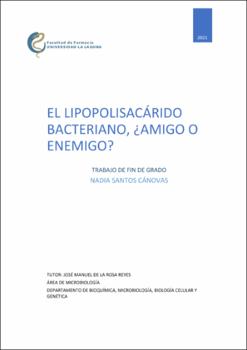El lipopolisacárido bacteriano, ¿amigo o enemigo?
Autor
Santos Cánovas, NadiaFecha
2022Resumen
La microbiota humana comprende las comunidades de microorganismos que
conviven en simbiosis con el hospedador y su apropiado balance. La microflora más
abundante y diversa es la intestinal, y por tanto la que más impacto tiene sobre la
salud. En humanos tiene la capacidad de modular no sólo los procesos inmunes a
nivel intestinal, sino que también produce efectos sobre el sistema inmunológico
sistémico, pudiendo afectar a enfermedades no intestinales. La relación simbiótica con
los microorganismos que habitan el organismo es beneficiosa para el ser humano, el
problema radica ante una disbiosis de la microbiota, con sobreproducción de
productos bacterianos como el lipopolisacárido (LPS) y una respuesta
desproporcionada o inadecuada por parte del sistema inmunológico, lo que podría
ocasionar inflamación y lesiones, originando un proceso patológico. La translocación
de bacterias y/o de sus productos proinflamatorios a otras localizaciones del
organismo conduce al desarrollo de enfermedades extraintestinales: trastornos
metabólicos (obesidad, diabetes mellitus), hepáticos (cirrosis e hipertensión portal),
neurológicos (Alzheimer, depresión, ansiedad). Conociendo la importancia de la
microbiota y tomándola en consideración como un posible factor desencadenante de
enfermedad, deberíamos considerar esta línea como variable a controlar a la hora de
desarrollar estrategias de prevención o tratamiento de las enfermedades. El
tratamiento con probióticos resulta prometedor, ya que se ha demostrado que
numerosos probióticos tienen la capacidad no sólo de restaurar la flora, sino de aliviar
la enfermedad asociada a la disbiosis. Otros factores a tener en cuenta serán la
alimentación, el sedentarismo, el tabaquismo o el alcoholismo, los cuales también se
han relacionado con la predisposición a la disbiosis. The human microbiota comprises the communities of microorganisms that coexist
in symbiosis with the host and their appropriate balance. The most abundant and
diverse is the intestinal microbiota, and therefore the one that has the greatest impact
on health. In humans, it has the ability to modulate not only the immune processes at
intestinal level, but also produces effects on the systemic immune system, and can
affect non-intestinal diseases. The symbiotic relationship with the microorganisms that
inhabit the organism is beneficial for humans, the problem lies in a dysbiosis of the
microbiota, with overproduction of bacterial products such as the lipopolysaccharide
(LPS) and a disproportionate or inadequate response by the immune system, which
could cause inflammation and lesions, originating a pathological process. The
translocation of bacteria and/or their pro-inflammatory products to other locations of
the organisms leads to the development of extraintestinal diseases: metabolic
disorders (obesity, diabetes mellitus), hepatic (cirrhosis and portal hypertension) or
neurological (Alzheimer, depression, anxiety). Knowing the importance of the
microbiota and taking it into consideration as a possible triggering factor of disease,
we should consider this line as a variable to be controlled when developing strategies
2
for the prevention or treatment of diseases. Treatment with probiotics is promising, as
many probiotics have been shown to have the capacity not only to restore flora, but
also to alleviate disease associated with dysbiosis. Other factors to take into account
will be diet, sedentary lifestyle, smoking or alcoholism, which have also been linked to
a predisposition to dysbiosis.





